Botany tutoring provides personalized learning experiences that combat plant blindness, improve academic performance by up to 98%, and prepare students for growing career opportunities in plant sciences, agriculture, and environmental conservation fields.
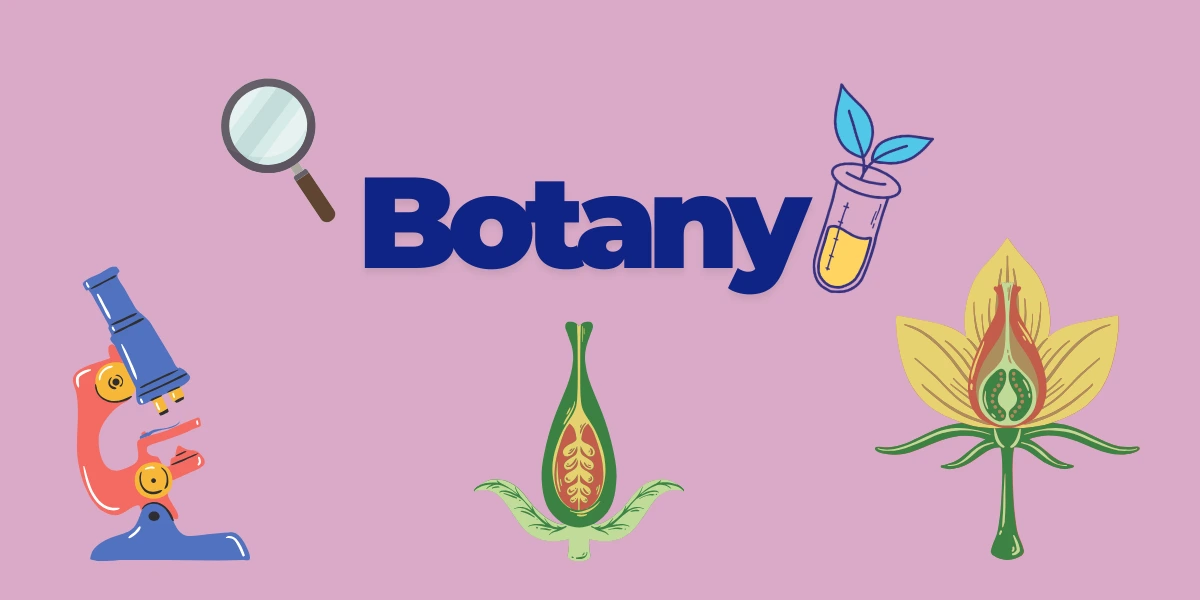
The Growing Need for Botany Education Support
Sarah, a 16-year-old student from Manchester, struggled to connect with her botany lessons. Like many of her peers, she found plants “boring” and couldn’t see their relevance to her future. After enrolling in botany tutoring online, Sarah discovered the fascinating world of plant genetics and their role in addressing climate change. Today, she’s pursuing a degree in environmental science.
Sarah’s story reflects a global challenge in science education. Research from the University of Nottingham reveals that only one student graduated in botanical sciences for every 185 students from other bioscience disciplines between 2007 and 2019. This dramatic decline in plant science education has created what experts call “botanical education extinction.”
The consequences extend far beyond classroom walls. According to UNESCO education statistics, agricultural development serves as one of the most powerful tools to end extreme poverty and feed a projected 9.7 billion people by 2050. Yet students lack the foundational plant knowledge needed to tackle these challenges.
Understanding Plant Awareness Disparity in Modern Education
Modern students suffer from what researchers term “plant awareness disparity” (PAD), formerly known as plant blindness. This phenomenon describes students’ inability to notice or appreciate plants in their environment, leading to naive perspectives about plant importance.
Studies using the Plant Awareness Disparity Index show that students demonstrate significant improvements in plant knowledge and attention when exposed to specialized botanical curricula. Research published in PMC journals indicates that targeted interventions can increase students’ plant awareness scores significantly from pre-test to post-test measurements.
The four components of plant awareness disparity include:
- Attitude (not liking plants)
- Attention (not noticing plants)
- Knowledge (not understanding plant importance)
- Relative interest (finding animals more interesting than plants)
These four components create a psychological barrier that makes botany feel harder than it actually is. Let’s visualize how these factors overlap to create ‘Plant Blindness’.
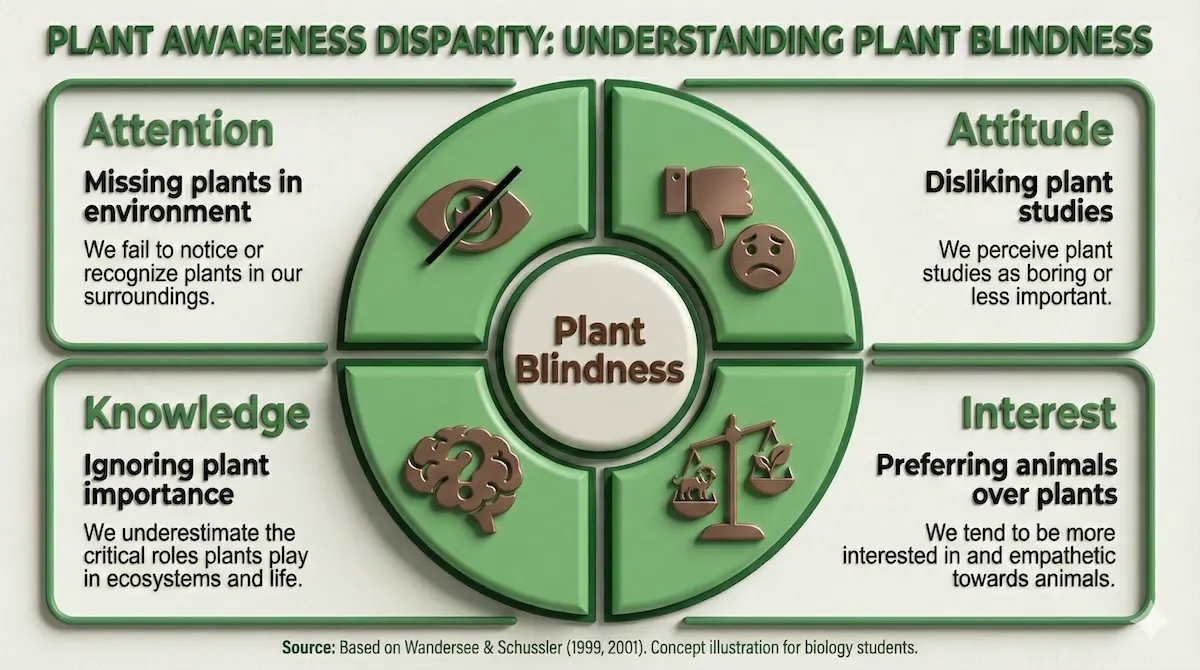
Understanding the four pillars of Plant Awareness Disparity helps students identify why they might struggle with botany.
Recognizing which of these four quadrants affects you most is the first step toward overcoming the disparity.
Effective botany tutoring addresses each component through personalized instruction and hands-on learning experiences that make plant science relevant and engaging.
The Science Behind Effective Botany Tutoring
Educational research consistently demonstrates the power of personalized learning. Benjamin Bloom’s groundbreaking 1984 study found that students receiving one-on-one tutoring perform two standard deviations higher than average students in traditional classroom environments. This means tutored students perform better than 98% of their non-tutored peers.
The statistics are staggering when we look at the performance gap between solitary study and guided learning. The graph below illustrates Bloom’s famous ‘2 Sigma Problem’ findings.
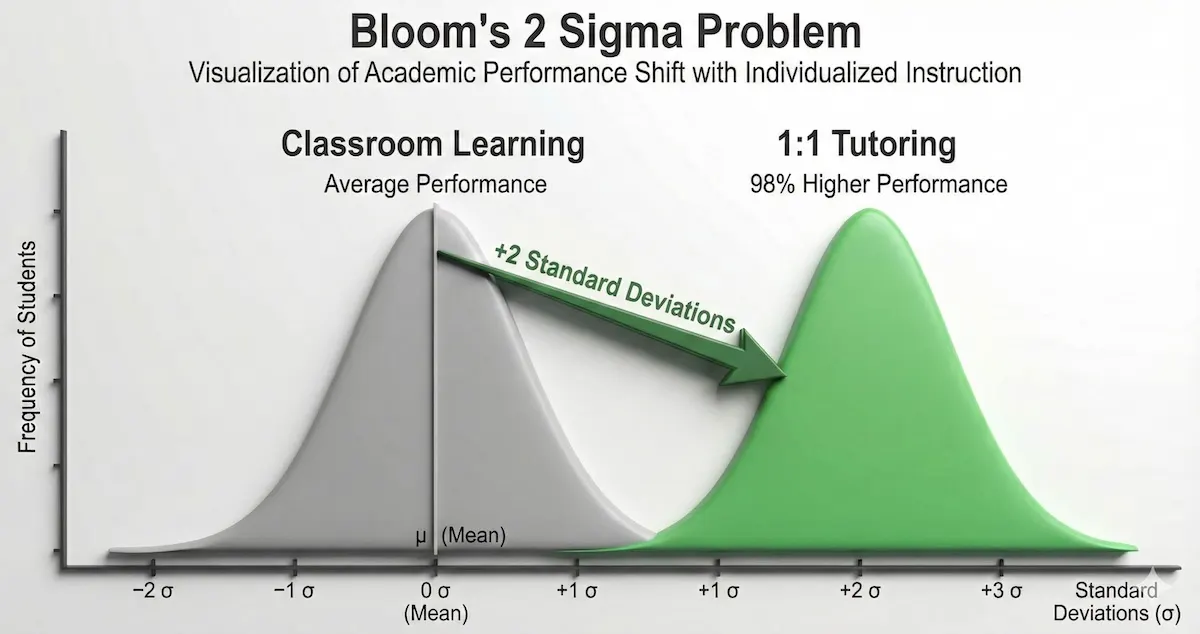
Research shows that personalized 1-on-1 tutoring can shift student performance by two standard deviations, outperforming 98% of peers.
As the data shows, personalized intervention shifts the average student into the top 2% of performers.
For botany specifically, research-infused curricula show remarkable results. The University of North Carolina-Asheville found that students in research-based botanical programs demonstrated measurable gains in plant transpiration knowledge, invasive species understanding, and population genetics comprehension. Students also showed improved scientific writing skills and enhanced statistical knowledge.
A botany tutor online can replicate these research-backed methods through:
- Personalized learning plans targeting individual weaknesses
- Interactive simulations and virtual laboratory experiences
- Real-world problem-solving scenarios
- Regular assessment and progress tracking
Addressing Different Learning Styles in Plant Science
Modern botany teaching recognizes that students learn differently. Garden-based learning research from Hong Kong demonstrates that hands-on experiences enhance plant literacy and promote higher-order thinking. Students in practical programs showed significant improvements in environmental attitudes and willingness to take conservation action.
Online botany tutors can accommodate various learning preferences through:
- Visual learners: Digital microscopy, plant identification apps, and illustrated diagrams
- Auditory learners: Recorded lectures, discussion sessions, and verbal explanations
- Kinesthetic learners: Virtual laboratory simulations and interactive plant models
Not every tool works for every student; the key is matching the technology to your specific learning preference. Use this reference guide to pick the tools that match your style.
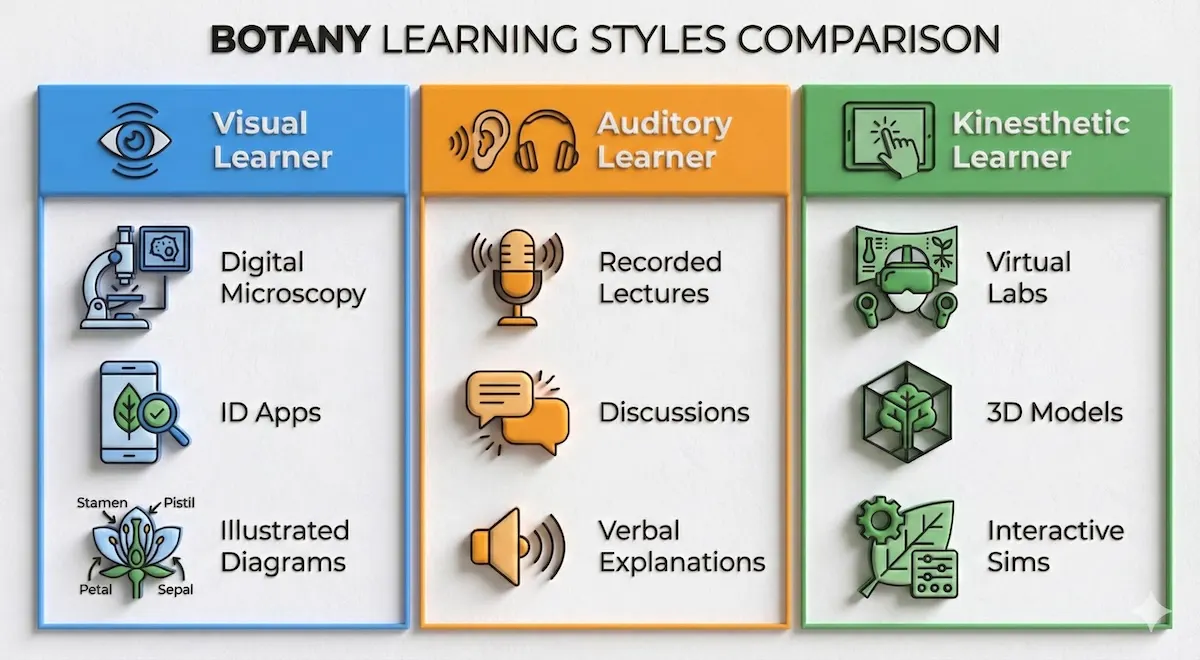
Identify your learning style to choose the right digital botany tools, from virtual labs for kinesthetic learners to ID apps for visual learners.
By focusing on the column that matches your learning style, you can stop wasting time on resources that don’t stick.
Career Opportunities Driving Botany Education Demand
The career landscape for botany graduates has never been more promising. World Bank data indicates that agricultural growth remains 2-3 times more effective at reducing poverty than equivalent growth in other sectors. This creates substantial demand for plant science professionals worldwide.
Current salary ranges for botany careers in developing markets show competitive compensation:
- Botanist: ₹4-5 LPA (approximately $48,000-60,000 annually)
- Plant Taxonomist: ₹4.5 LPA
- Ecologist: ₹5.9 LPA
- Environmental Consultant: ₹7.7 LPA
- Agronomist: ₹5.1 LPA
Many students worry about financial stability, but modern plant science offers competitive compensation packages. Here is a snapshot of current salary potential across key botany sectors.
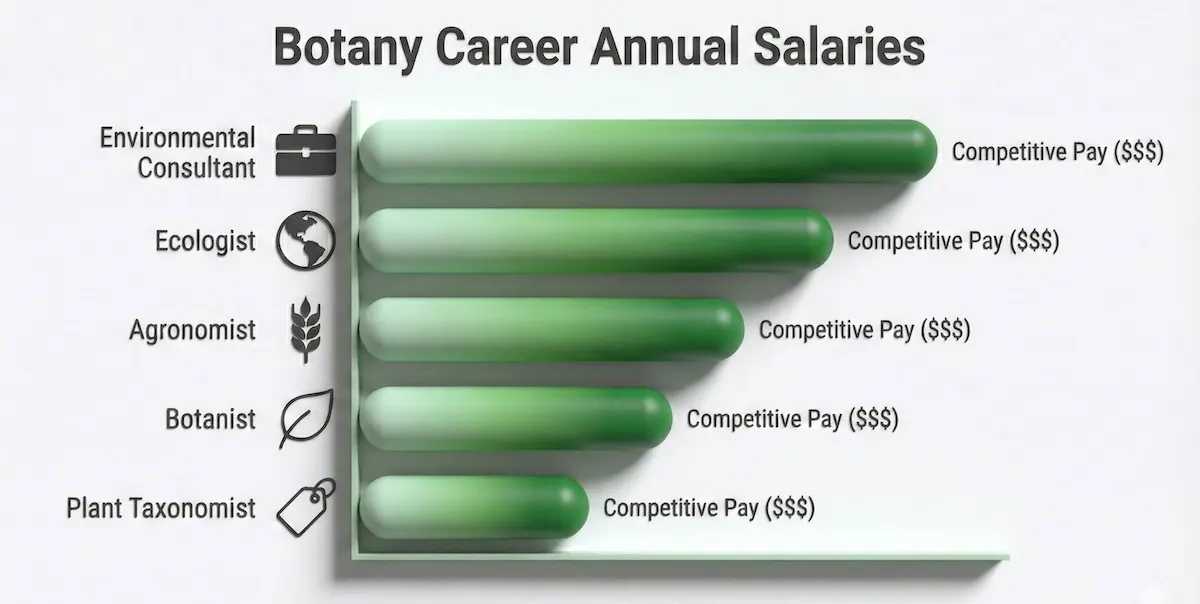
Modern botany careers offer competitive compensation, with roles like Environmental Consulting and Ecology leading the market.
As shown, specialized roles like Environmental Consulting and Ecology are currently seeing the highest demand and compensation.
In developed markets like the UK and USA, these figures typically range 40-60% higher, making botany homework help and comprehensive tutoring investments that pay long-term dividends.
Emerging Fields Requiring Plant Science Knowledge
Climate change adaptation creates new career paths requiring advanced botanical knowledge. Students with strong plant science foundations can pursue careers in:
- Urban agriculture and vertical farming
- Plant biotechnology and genetic modification
- Conservation biology and ecosystem restoration
- Pharmaceutical plant research
- Sustainable agriculture consulting
These fields require the deep understanding that quality botany assignment help and tutoring can provide.
Choosing the Right Botany Tutoring Approach
Effective botany tutoring requires more than subject knowledge. Research on personalized education shows that students must contribute actively to connecting learning materials with their interests and career aspirations. This approach proves especially effective for students with low initial confidence in science subjects.
When selecting a botany teacher or tutoring service, consider these evidence-based factors:
Tutor Qualifications and Experience
- Advanced degrees in plant sciences, biology, or related fields
- Teaching experience with diverse student populations
- Familiarity with current university entrance requirements
- Knowledge of real-world applications and career paths
Curriculum and Learning Materials
- Alignment with national and international biology standards
- Integration of current research and discoveries
- Hands-on activities and virtual laboratory components
- Regular assessments and progress tracking
Technology and Accessibility
- User-friendly online platforms for distance learning
- Interactive tools and multimedia resources
- Flexible scheduling to accommodate different time zones
- Technical support and troubleshooting assistance
With so many options available, how do you filter for quality? We’ve created a simple decision checklist to help you vet potential tutors effectively.
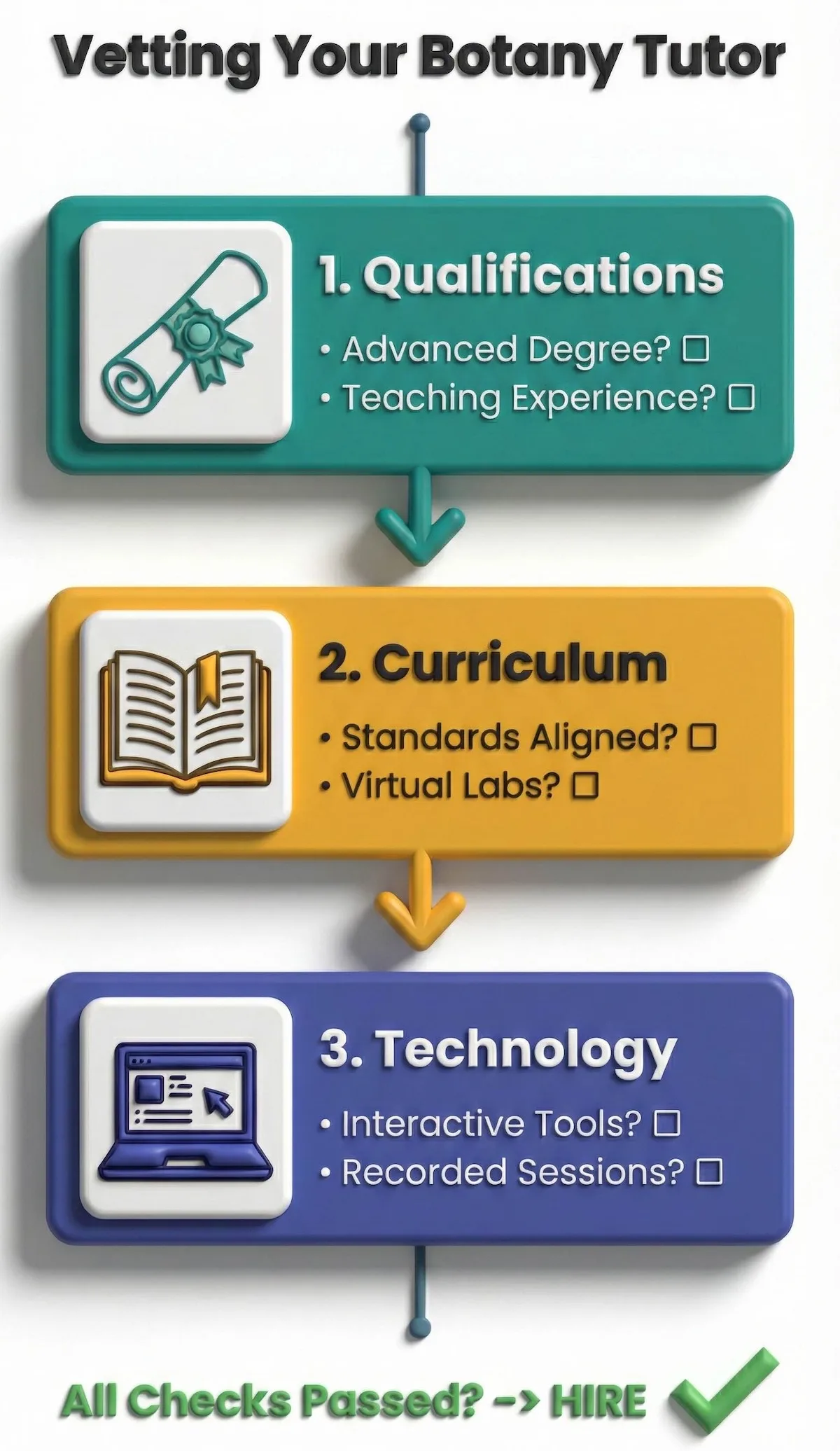
Use this 3-step checklist to ensure your potential tutor has the right qualifications, curriculum, and technology stack.
If a potential tutor cannot check all three boxes—qualifications, curriculum, and technology—keep looking.
Overcoming Common Botany Learning Challenges
Students often struggle with botany concepts due to their abstract nature and complex terminology. Research shows that 90% of students who increased their confidence also improved their grades, highlighting the importance of building student self-efficacy.
Common challenges include:
Plant Identification and Taxonomy
Traditional memorization-based approaches often fail to engage students. Modern botany hw help incorporates interactive identification keys, comparative morphology exercises, and field guide applications that make learning systematic classification engaging and practical.
Understanding Plant Physiology
Complex processes like photosynthesis, respiration, and nutrient transport benefit from visual modeling and step-by-step breakdowns. Tutors can use animations, simulations, and real-time experiments to clarify these fundamental concepts.
Connecting Theory to Real-World Applications
Students often ask, “When will I use this?” Effective tutoring connects botanical concepts to current events, environmental challenges, and potential career applications, making learning immediately relevant.
The Digital Revolution in Botany Education
Online tutoring platforms have transformed access to quality botanical education. Students in remote areas can now access expert instruction that was previously unavailable. Research comparing online versus in-person tutoring effectiveness shows that online tutoring now matches or exceeds in-person effectiveness for 83% of students.
Digital advantages include:
- Access to global plant databases and research libraries
- Virtual field trips to botanical gardens and research facilities
- Real-time collaboration with international student groups
- Recorded sessions for review and reinforcement
Online tutoring is no longer just a video call; it is an entry point into a vast digital ecosystem. Here is how modern platforms connect you to global scientific resources.
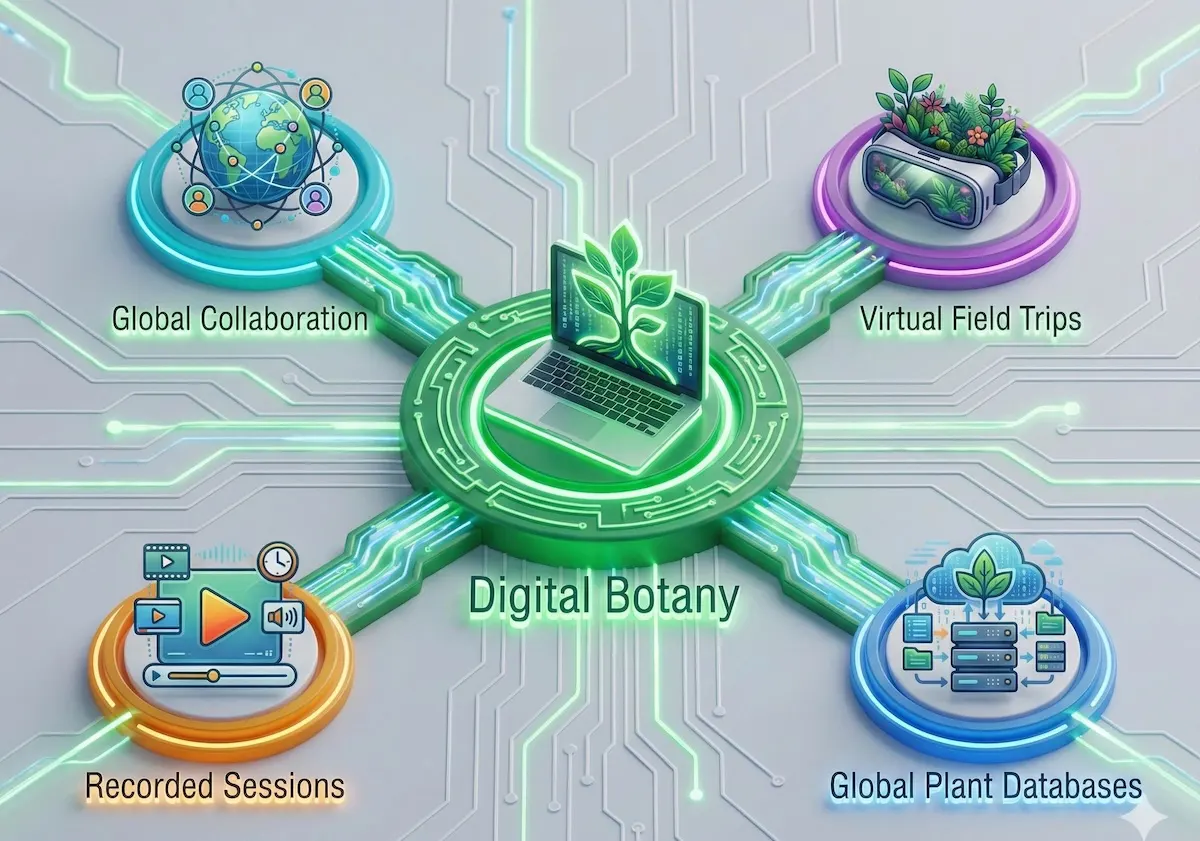
The digital revolution connects students to global resources, from virtual field trips to international research databases.
This interconnected network ensures you aren’t just learning from a textbook, but engaging with live, evolving science.
Students can now hire a botany tutor from anywhere in the world, accessing specialized expertise that matches their specific learning needs and career goals.
Building Future Plant Scientists
The next generation of botanists will tackle challenges their predecessors never imagined. Climate change, food security, and biodiversity loss require innovative solutions grounded in deep plant science understanding.
Quality botany tutoring prepares students for these challenges by:
- Developing critical thinking and analytical skills
- Fostering curiosity about plant-environment interactions
- Building confidence in scientific methodology
- Connecting students with research opportunities and mentorship
Universities worldwide report that students with strong botanical foundations demonstrate higher success rates in advanced biology courses and research programs. This early investment in plant science education pays dividends throughout students’ academic and professional careers.
Success Stories and Outcomes
Students who receive comprehensive botany tutoring demonstrate remarkable improvements. Research tracking over 300 classroom students shows that research-infused botanical curricula increase students’ knowledge and awareness of plant science topics while improving scientific writing and statistical knowledge.
Long-term outcomes include:
- Higher university acceptance rates for competitive biology programs
- Increased participation in science research competitions
- Greater likelihood of pursuing STEM careers
- Enhanced environmental awareness and conservation engagement
Students who struggled initially often become passionate advocates for plant sciences, demonstrating the transformative power of quality tutoring support.
Making Botany Tutoring Accessible Worldwide
Geographic and economic barriers historically limited access to specialized science tutoring. Online platforms now democratize access, connecting students in rural areas with expert instructors from leading universities.
Financial accessibility remains crucial. Many tutoring services offer:
- Sliding scale pricing based on family income
- Group tutoring options to reduce individual costs
- Scholarship programs for underrepresented students
- Free trial sessions to demonstrate value
This increased accessibility helps address global shortages in plant science professionals while ensuring diverse perspectives in botanical research and conservation efforts.
Frequently Asked Questions
Q1 How effective is online botany tutoring compared to in-person instruction?
Research shows online tutoring matches or exceeds in-person effectiveness for 83% of students, with many preferring the flexibility and access to specialized resources.
Q2 What qualifications should I look for in a botany tutor?
Seek tutors with advanced degrees in plant sciences, proven teaching experience, and familiarity with current university entrance requirements and career paths.
Q3 How can botany tutoring help with university applications?
Strong botanical knowledge demonstrates scientific rigor and environmental awareness, qualities highly valued by admissions committees for biology and environmental science programs.
Q4 What age is appropriate to start botany tutoring?
Students as young as 12 can benefit from age-appropriate plant science instruction, with research showing earlier exposure leads to greater long-term interest and success.
Q5 How does botany tutoring address plant blindness in students?
Specialized curricula target the four components of plant awareness disparity through hands-on activities, real-world applications, and personalized instruction that makes plants relevant and interesting.
Q6 What career opportunities exist for students with strong botanical knowledge?
Career paths include research positions, environmental consulting, agricultural development, biotechnology, conservation work, and education, with competitive salaries and growing demand globally.
Related Subjects
Agronomy
Astrobotany
Cytology
Dendrology
Ethnobotany
Forestry
Horticulture
Marine Botany
Paleobotany
Pharmacognosy
Phytochemistry
Plant Anatomy
Plant Evolution
Plant Pathology
Plant Taxonomy
******************************
This article provides general educational guidance only. It is NOT official exam policy, professional academic advice, or guaranteed results. Always verify information with your school, official exam boards (College Board, Cambridge, IB), or qualified professionals before making decisions. Read Full Policies & Disclaimer , Contact Us To Report An Error

